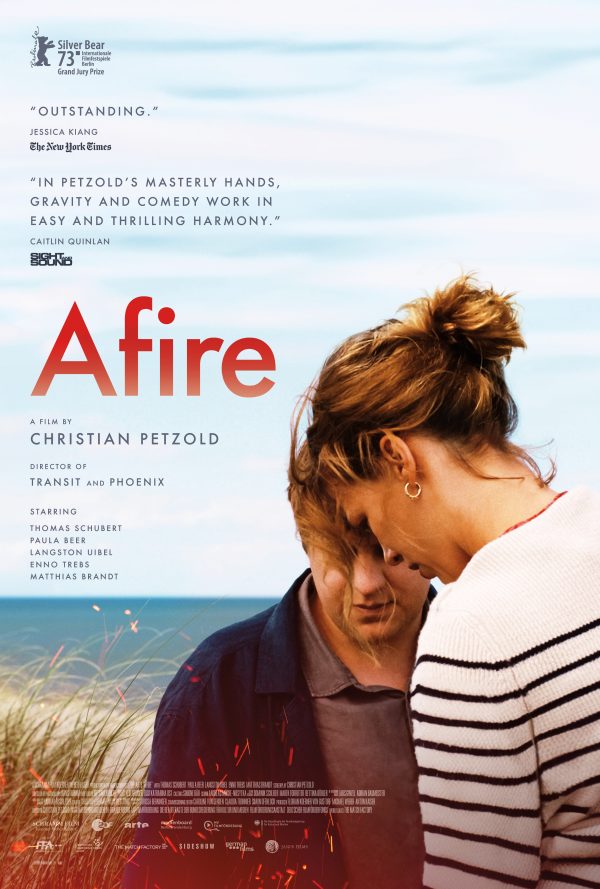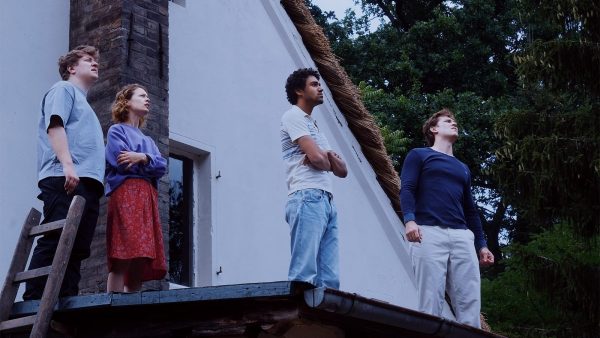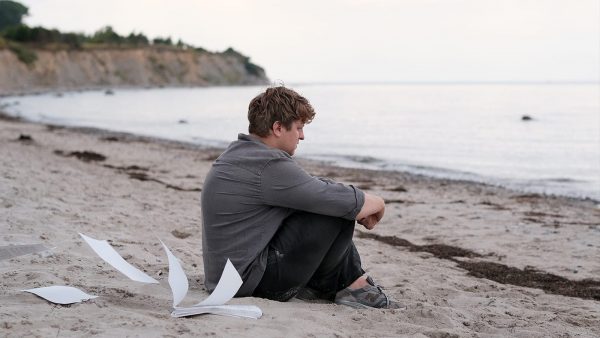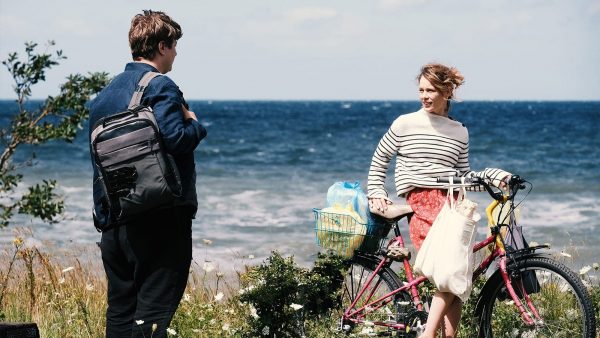‘Afire’ explores what can occur when clearing the slate

“Afire” (“Roter Himmel”) (2023). Cast: Thomas Schubert, Paula Beer, Langston Uibel, Enno Trebs, Matthias Brandt. Director: Christian Petzold. Screenplay: Christian Petzold. Web site. Trailer.
Leon seeks to put the finishing touches on his second novel, a book with which he’s rather dissatisfied, an effort that comes up short of his expectations, not to mention the quality of his first title. He’s anxious about wrapping up the project, especially since he senses that his publisher, Helmut (Matthias Brandt), feels the same way he does about the book. Consequently, he dreads what he has to get done before an upcoming meeting with Helmut, a task he’s not sure he can complete on time or in good order. It’s a tremendous source of stress, preoccupying his thoughts and keeping him from thinking about virtually anything else (like enjoying the prospect of spending some time relaxing).
As for Felix, he needs to work on creating a portfolio as part of his art school application. He’s unclear on what he wants to do, and he hasn’t made much progress on assembling it, even though he, like Leon, is facing a looming deadline. Unlike Leon, however, he’s not sweating what he’s up against; he’s confident that he’ll finish the work on time and that it will turn out fine. In the meantime, he remains optimistic and enthusiastic. And, no matter what, he’s not going to let the pressure get the better of him – or spoil his summer vacation.

Upon arrival at the vacation house, however, conditions aren’t exactly what Leon and Felix expected. As it turns out, Felix’s mother lost track of the date of their arrival and rented out one of the bedrooms to a young, beautiful, enigmatic woman, Nadja (Paula Beer), a soft-spoken, laconic sort who makes up for this subdued attribute with a series of frequent noisy nighttime visitations.
As one might expect, Leon and Felix each have their own predictable reactions to this surprise house guest. Leon sees Nadja’s presence as annoying and intrusive, an insidious (if somewhat overblown) inconvenience with respect to rooming arrangements, not to mention the overnight sound levels in a small house with thin walls. He also firmly believes that she’ll prove to be a significant disruption to getting his work done. By contrast, Felix finds Nadja delightful and is eager to get to know her, particularly when she introduces him to one of her nighttime visitors, Devid (Enno Trebs), a hunky bisexual lifeguard who Felix is even more anxious to get to know. And, with this eclectic foursome in place, the summer is about to begin.
As the days pass, Nadja, Felix and Devid all become good friends, frequently enjoying one another’s company, while Leon sits on the sidelines and sulks. He rarely and only reluctantly joins in on any group social events, often citing his “need to work” as an excuse for bowing out. The only problem with that is that Leon doesn’t actually do much work, even with his recurring protestations and a supposedly pressing deadline looming. To complicate matters, Leon’s lack of progress on his book is drawn into sharp contrast to the growing number of personal and professional accomplishments of the others, such as the unveiling of Felix’s portfolio idea. Leon’s missing out on a lot of fun, too, with his stick-in-the-mud ways. His attitude keeps getting in the way, most notably where his quietly simmering attraction to Nadja begins to grow, even if these feelings go virtually unexpressed.
Needless to say, the emotional tension in the household mounts as everyone seems to be happy and productive except Leon. And, as this condition steadily escalates, it’s reflected back to the house guests in the nature of their surroundings, most notably the encroachment of a devastating forest fire creeping ever closer to the nearby woods, as evidenced by an ominous nighttime glow in the sky and the increased presence of firefighting helicopters buzzing overhead. Winds off the water have kept the conflagration at bay for some time, but, with the rise in the fiery mood at the vacation house, there’s a corresponding change in the path of the blaze, steering it ever closer toward it.

Circumstances reach a fever pitch when Leon musters up the courage to ask Nadja if she’d like to read his novel. She agrees and proceeds to give him her honest evaluation of the book, one that matches his own dismal assessment. That sentiment is, in turn, echoed back shortly thereafter when Helmut visits. He presents Leon with a heavily edited version of the work, one that still reads awkwardly, even after having had a heavy-handed red pencil taken to it. On top of that, during Helmut’s visit, he takes a liking to the other house guests, showering them with compliments on their achievements and hospitality, rendering Leon virtually irrelevant and invisible. Talk about turning up the heat.
With relations in the house strained and the surroundings threatening to go up in flames, the hoped-for summer vacation turns out to be anything but a fun and relaxing time, at least where Leon is concerned. But, with the winds of change poised to sweep over the area, what’s happened so far is only a glimmer of what’s yet to come – and what will emerge out of it.
This requires us to take a good, hard look at our thoughts, beliefs and intents, and that’s important given the roles that they play in the manifestation of our existence, a product of the conscious creation process, the philosophy that maintains these resources underlie the reality we experience. Some of us are no doubt familiar with this thinking, but, for others, it can be a difficult realization to grasp and accept. Nevertheless, if we find that our lives aren’t working in certain respects, we need to look inward to find out why, and this is as good a place as any to start. By scrutinizing our beliefs, rewriting them as necessary and chopping out any burdensome dead wood, we have an opportunity to start over and move in a new direction toward greater satisfaction and fulfillment.
To a certain extent, this is true of all the principal characters in this film, but it’s especially the case for poor Leon. It’s obvious he needs to get down to business in this regard. What’s worse, though, is that he doesn’t even recognize the need for this. He plods along, continuing to do whatever it is that he has apparently been doing for a long time, remaining mired in his relentless funk and never questioning the need or possibility of doing anything different. He’s plainly tired of and dissatisfied with this routine, too, forever sitting back and complaining yet making no effort to shift gears. In fact, as this story plays out, he’d rather procrastinate than take any action to rectify his situation. Talk about a need for intervention.

That’s where this summer retreat comes into play. Leon desperately needs to move on from where he’s at (and apparently from where he’s been for a long time). And, on a subconscious level, there’s a part of him that must understand that, as seen in the many elements of his existence that have tried to shake him out of his complacency, no matter how much he’d rather not do so, at least outwardly speaking. Consider the evidence: The people around him approach life from a more joyful standpoint, attitudes he often finds annoying and frivolous; unexpected developments, such as Nadja’s presence and the encroaching forest fire, throw him curves that urge him to implement a more malleable approach toward life and his various pursuits, both personally and professionally; frequent though admittedly exaggerated distractions keep him from getting his work done (or so he thinks), despite the fact that it’s work he really doesn’t want to do in the first place; and the frank criticisms of his book by Helmut and Nadja are less-than-subtle wake-up calls that maybe he should be putting aside his current writing project in favor of something new and different with better literary potential. But the key question in this is, “Does he see things that way (or, perhaps more precisely, does he really want to see things that way)?”
This is particularly true when it comes to how Leon views life in general: Is it meant to be something enjoyed or something endured? In a videotaped interview with writer-director Christian Petzold, the filmmaker states that this is one of the objectives behind this story. So many people, he says, are so preoccupied with work, their careers and their professional achievements that they lose sight of many of the joys that life has to offer (an observation that probably accounts for the inclusion of more humor in this film than in most of Petzold’s previous releases, an attempt to metaphorically lighten things up). Just look at Leon’s case: he’s in a beautiful vacation setting, with ample opportunities for recreation and enjoyment, and in the presence of a possible romantic interest, yet he’d rather play the curmudgeon, ever complaining, missing out on a chance for a good time and spinning his wheels trying to resuscitate a dreadful book that probably can’t be salvaged. Where’s the perspective in all that? Is that life serving him? And, if not, why isn’t he making an effort to change it to something more suitable? The clues for how to improve upon his lot in life are all around him, too, but can he – or will he – see them?
Leon only need look to the examples set by his companions: Felix is thrilled when he finally hits on an idea for his portfolio (especially when he receives a ringing endorsement from Helmut when he shows it to him during his visit). Felix is also ecstatic when his relationship with Devid grows and blossoms, filling them both with tremendous joy. And both Devid and Nadja are content with the summertime jobs they’ve taken, he as a lifeguard and she as a purveyor of ice cream cones to tourists along Ahrenshoop’s waterfront boardwalk. Those may seem like comparatively simple pleasures and ventures, but look at how much happiness they provide. How can Leon top that?
So why isn’t Leon shifting gears? Perhaps it’s because he’s unaware of – or maybe even afraid of – the power of choice available to him. He’d rather surround himself with the familiar than strike out in a new (but potentially scary) direction. But, as circumstances unfold here, he may not be able to fall back on that option for much longer. With conditions changing all around him (conditions that he has unwittingly drawn into his realm of existence), he might soon be forced to adapt to what’s transpiring. He may have long been comfortable with “the devil you know rather than the devil you don’t,” but, as the devil he knows is steadily vanishing, he may soon be forced to deal with a strange new demon, no matter how much he may try to resist it. With the prospect of the slate being swept clean, he might have to contend with bottoming out and losing everything.

But is that possibility necessarily a bad thing? From both a literal and metaphorical standpoint, fire is a force that can destroy and devastate, but it’s also one that can cleanse, clearing away anything of questionable value to make room for robust, vigorous, valuable new growth. And, sometimes, it can do both simultaneously. Maybe it would be in Leon’s best interests to embrace what’s on its way, to make friends with change and the possibilities it may afford. Such scenarios might involve going out in a blaze of glory while clearing a path to something even grander, enabling us to bask in the glow of something eminently more rewarding. For Leon, that might prevent him from becoming a has-been author doing mediocre work with little fulfillment. Indeed, sometimes it takes burning a supposedly treasured resource to generate some light and heat, but where would we be without those things?
“Afire” is an engaging slowburn in every sense of the word, one that grows progressively more captivating as its enigmatic narrative plays out. The outset may come across as somewhat cryptic, even meandering at times, but the opening act sets the stage for what’s to follow in the back half. The picture subsequently presents a witty but profoundly insightful examination of what makes us who we are, how much we enjoy or endure our lives, and what we can do to make it better for ourselves when we eliminate what no longer serves us. The film’s subdued humor is deceptively gentle, imbued with a quietly biting underlying edge delivered with well-mannered precision and dexterity. That’s particularly apparent during Helmut’s reading of Leon’s reworked manuscript, an excellent example of truly awful but stunningly hilarious writing brought to life. In many respects, this wry offering is probably not what most viewers will expect, but, then, that’s a huge part of its appeal, a refreshing look at life and what we make of it. It’s a valuable exercise given how abruptly it can all be taken away, leaving us to ask ourselves, “What did we do with the time we had, and was it indeed worth it in the end?” Give this one sufficient time to unfold, and let it gradually sink in. It offers a lesson that may help us realize and understand more about ourselves than we can possibly imagine. The film is currently playing theatrically.
When it comes to fire, it can leave us warmed up or seriously burned. The question is, “Which of those options do we wish to embrace?” That all depends on how we view it, which, in turn, is rooted in the beliefs we hold about it. It will leave an impact on us no matter which view we take. In either case, though, the choice is ours – as is what it leaves us with.
Copyright © 2023, by Brent Marchant. All rights reserved.



